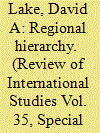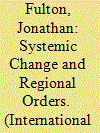|
|
|
Sort Order |
|
|
|
Items / Page
|
|
|
|
|
|
|
| Srl | Item |
| 1 |
ID:
085834


|
|
|
|
|
| Publication |
2008.
|
| Summary/Abstract |
The strategic gap between India and Pakistan compels Islamabad to pay attention to its northern dimension, namely Afghanistan and Central Asia. For this reason, in order to avoid being threatened from the North and the South at the same time, Pakistan has always tried to get a friendly government in Afghanistan. During the 1980s and the 1990s a series of events, such as the invasion of Afghanistan, the involvement of Pakistan in the conflict and then the emergence of War on Terror, have changed dramatically the regional situation. At the end of the 1990s there were two separate Regional Security Complexes, the Central and the South Asian ones, divided by Afghanistan, an insulator state. At present, we see how these two Regional Security Complexes have converged in a common point-Afghanistan-which is the hub of a new Regional Security Complex (South-Central Asian RSC) involving these two regions.
|
|
|
|
|
|
|
|
|
|
|
|
|
|
|
|
| 2 |
ID:
087930


|
|
|
|
|
| Publication |
2009.
|
| Summary/Abstract |
The ordering principle of international relations varies widely across regional
security complexes and has profound effects on regional order. States form hierarchies over
one another based on relational authority, which itself rests on social contract theories that
posit authority as an equilibrium of an exchange between a dominant state and the set of
citizens who comprise the subordinate state. Regional orders emerge because of the strong
positive externalities of social order and economies of scale in its production, and the mutually
reinforcing legitimacy accorded the dominant state by local subordinates. This implies that
regions characterised by the hierarchy of single dominant states will possess more peaceful
regional orders. Regions often described as pluralistic security communities in which cooperation
is understood to have emerged spontaneously from anarchy are better described as
regional hierarchies in which peace and conflict regulation are the products of the authority of
a dominant state.
|
|
|
|
|
|
|
|
|
|
|
|
|
|
|
|
| 3 |
ID:
115336


|
|
|
|
|
| Publication |
2011.
|
| Summary/Abstract |
This article updates the arguments about the South Asian regional security complex (RSC) given in Buzan and Wæver's (2003) Regions and Powers (RaP). In terms of the South Asian RSC itself, there have been lots of events, but little in the way of structural change from the analysis in RaP. In terms of South Asia's regional context, the picture is mixed. In relation to the Gulf, there has been a minimal structural change. However, in relation to East Asia, there are more signs of interaction between the South and East Asian regional security complexes, mainly hinging on the rise of China. This is not yet sufficient to talk of the two having merged, but a wider Asian supercomplex is clearly emergent and becoming stronger. In terms of South Asia's position in the global system, India's claim for great power status is now plausible, though the role of the United States in both East and South Asia remains similar. But, the global level itself is probably moving towards a scenario in which a system, containing several great powers and no superpowers, becomes more regionalized. This trend has deep roots, and the key question for India is what balance it wants to establish through its engagement with its own region, the wider East Asian region, and at the global level.
|
|
|
|
|
|
|
|
|
|
|
|
|
|
|
|
| 4 |
ID:
188166


|
|
|
|
|
| Summary/Abstract |
The Persian Gulf regional security complex is shaped by intense competition between regional states and, since the aftermath of Operation Desert Storm, US military preponderance. US security cooperation with the Gulf Cooperation Council member states has sustained a status quo that has allowed extra-regional countries to advance their interests without making significant contributions to regional stability. An examination of the presence of five Asian countries (China, India, Japan, Singapore and South Korea) in the Gulf suggests that, as the US signals intentions to reduce its security commitments to the region, the perception of hegemonic retreat will influence the regional policies adopted by these Asian countries. A further and related consideration is the ‘great-power competition’ narrative that is driving politics at the systemic level. The US-China bilateral relationship will have a significant impact on extra-regional powers’ approach to the Gulf.
|
|
|
|
|
|
|
|
|
|
|
|
|
|
|
|
|
|
|
|
|